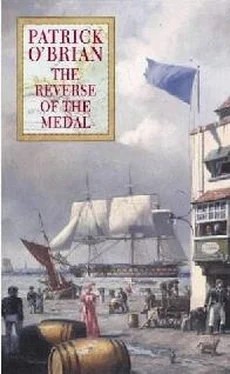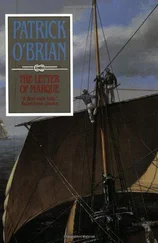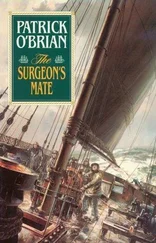1 ...8 9 10 12 13 14 ...65 Stephen Maturin's were not much higher. Captain Palmer of the Norfolk had been suffering from a quartan ague and melancholia ever since the far South Sea: and since Butcher's medicine-chest had gone down with the ship, Stephen had prescribed for him, at first with considerable success. The ague and its sequelae had slowly yielded to Jesuits' bark and sassafras, but since their eastward rounding of the Horn the melancholia had grown steadily worse.
'He will cut his throat if he is not watched,' observed Butcher as they walked away.
'I am afraid so,' said Stephen. 'Yet the tincture of laudanum seemed to be having a radical effect. flow I wish I could come at the leaves of coca, the Peruvian shrub. That would stir the desponding wretched mind far beyond our milk-and-water belle-bore.'
Here they were interrupted by the coming of the boat, and Stephen returned to the Surprise. Her captain had come aboard without ceremony, hooking on to the larboard chains only a few minutes before, and be gave Stephen a hand over the side. 'Have you had dinner?' he asked, for the gunroom hour was long passed.
'Dinner? Perhaps not,' said Stephen. 'No, I have certainly not had dinner.'
'Then come and take a bite with me: though God knows,' he added, leading the way into the cabin, 'there is nothing like a court-martial for cutting one's appetite.'
'It wants seventeen minutes of the hour, sir,' said Killick, with a surly look, as though he had been found in fault. 'Which you said four o'clock, it being a court-martial day.'
'Never mind,' said Jack. 'Tell the cook to stir his stumps, and bring some sherry while we are waiting.'
They did not have to wait long. Jack's cook was from the East Indies; he was accustomed to be flayed if he did not feed his employers promptly, and before the second glass of sherry was out a fish soup filled the cabin with the scent of saffron, lobster, crab, bonito, mussels, clams, and a wide variety of small coral fishes - fishes, that is to say, from the coral reef.
It was a splendid soup, one that they would ordinarily have taken up to the last drop; but this time they sent it away almost untouched. 'Did you ask the Admiral about Mr Barrow and Mr Wray?' asked Stephen, when the steak and kidney pudding had been set on the table.
'Yes, I did,' said Jack, 'and he told me that the position was unchanged.'
'Thank you for remembering,' said Stephen, pushing the soft white crust with a spoon. 'I wish this pudding may be cooked.' He expressed no opinion about the news, but in fact he was rather pleased. Although the ailing Mr Barrow was still nominally the Second Secretary of the Admiralty his work had been done for some considerable time by Andrew Wray, a youngish well-connected man who had gained a reputation for ability at the Treasury. Stephen had met him long before Wray had anything to do with the Navy - he was an acquaintance of Jack's - but he had come to know him well only when Wray, as acting Second Secretary, came out to Malta to deal with corruption in the dockyard and a much more serious affair of treachery in the island's administration, in which some highly-placed man seemed to be giving one of the French intelligence services secret information of the first importance. Yet it was not this that had brought them together; at the time it had seemed to Stephen that Wray, a newcomer to this highly-specialized and very dangerous work, did not enjoy the full confidence of Stephen's own chief, Sir Joseph Blain, the head of naval intelligence, who naturally enough preferred his agents to give proof of their powers and above all of their discretion before entrusting them with the lives of a whole network of men. These reticences were very usual in intelligence and counter-espionage, where a man might be admitted to the hall, but might wait there five years before reaching the inner closet. So although Stephen and Wray were on friendly terms and although they listened to music and played cards together - extraordinarily unfortunate cards for Wray, who now owed Stephen a small fortune, and not so small either - Stephen had not seen fit to speak of his own work in the Mediterranean or to mention his connection with Sir Joseph until the very last moment, when he had no choice about it. Quite independently he had identified the traitor and his French colleague, yet no sooner did he possess this precious information than he was obliged to leave the island. He therefore sent post-haste to Wray, who was in Sicily, telling him everything he knew (and thereby of course revealing his own identity) so that Wray might wipe out the whole organization. Unhappily, although the traitor had been seized, the chief French agent had escaped, perhaps because of Wray's inexperience. Stephen heard of all this in Gibraltar, just before setting off on the voyage that took him to the South Seas; and although he did not see Wray, who was returning to England overland, he took advantage of Wray's offer to carry a letter home. In undermining the French intelligence agents in Malta Stephen had made use of a very good-looking Italian lady; he had often been seen with her, and she had sailed with him in the Surprise as far as Gibraltar. It was generally supposed that she was his mistress. Word of all this had reached Diana, an unusually passionate, impulsive woman; she had written to him in unusually passionate, impulsive terms and his letter was designed to do away with her resentment of what she saw not as immoral conduct (she had no particular objection to immoral conduct) but as an intolerable public affront. Most unhappily his letter, in the nature of things, could not be wholly candid; it could not tell the whole truth, and he relied upon Wray's spoken word, or rather his tone of voice, to convey the essential underlying truth that he… could not write. He also wanted to hear every last detail of the Maltese plot and the facts behind the traitor's curious suicide, and these would be much more valuable coming straight from Wray than filtered through Mr Barrow, that inexhaustible bag of foolish self-complacent words, or even through Sir Joseph; for although Sir Joseph (for whom Stephen had collected a large number of beetles and some butterflies) was ten times the size of Wray, a man of great sagacity and immense experience, he had not been there, on the spot, in Malta. Besides, even if Wray was not in Sir Joseph's class he was still sharp, quick, perceptive and clever. Perhaps rather too clever: certainly too much given to high living and playing for high stakes. Stephen did not dislike him; he had found Wray something of a bore towards the end of his stay in Valletta, when he would insist on playing cards, losing steadily more and more until at last he was unable to pay and was obliged to ask for Stephen's forbearance, but Stephen did like his deep love for music and the way he had brought about (or at least brought out) the promotion of Tom Pullings, Jack Aubrey's first lieutenant, in spite of a rather ugly disagreement between Aubrey and Wray some years before - a disagreement whose exact details were unknown to Stephen but one that might have left ill-feeling in a malignant mind. As for Wray's promises about helping Jack to a heavy frigate on the North American station and Pullings to a sea-going command by way of gratitude for this forbearance, Stephen was not so simple as to look upon them as wholly binding contracts; but even so they were as well to have.
Simplicity was not perhaps one of Stephen's most outstanding characteristics; yet his mind was not wholly free of it and he had never even suspected the possibility of Wray's being a French agent. Nor, it must be confessed, had the even less simple Sir Joseph, whose only objection to Wray was his unsuitability, his inexperience and his want of discretion. Neither Stephen nor Sir Joseph could conceive the possibility of any French intelligence organization recruiting an expensive, gambling, fashionable, unreliable, loquacious rake, however sharp and clever.
Читать дальше
Конец ознакомительного отрывка
Купить книгу












